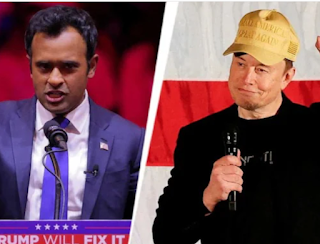Elon Musk’s rise to become the sole leader of the Department of Government Efficiency (DOGE) marks a significant shift in the agency’s leadership dynamics and strategic vision. Musk’s co-leader, Vivek Ramaswamy, exited the role amidst reports of “competing visions” and growing tensions with MAGA supporters, culminating in a departure that highlights the deep divisions within the Republican-backed initiative to streamline federal governance. The Washington Report’s detailed account of these developments underscores the high-stakes political and ideological battles that have shaped the agency's trajectory.
The Department of Government Efficiency was initially conceived in November following Donald Trump’s confirmation as President of the United States. Trump’s announcement of Musk and Ramaswamy as co-leaders of DOGE was met with widespread attention, as the duo was tasked with an ambitious mandate to slash federal spending, eliminate inefficiencies, and reform government agencies. Musk’s technological prowess and Ramaswamy’s regulatory expertise seemed complementary, and their collaborative efforts were poised to reshape the federal bureaucracy. However, cracks in their partnership became evident as the agency’s bold goals collided with differing strategies and priorities.
Ramaswamy’s January 21 departure, just days after Trump’s swearing-in, was presented as a pivot to his gubernatorial bid in Ohio, but insiders suggest a deeper narrative. Sources close to the matter point to growing ideological rifts between Ramaswamy’s constitutional, regulation-driven approach and Musk’s more aggressive, technology-led strategy. Ramaswamy advocated for legal pathways to cut regulations and reduce administrative overhead, emphasizing incremental and legally sound measures. Musk, in contrast, proposed sweeping reforms powered by data-driven strategies, emphasizing disruptive technology as the cornerstone of DOGE’s operations. Musk’s establishment of a command center at SpaceX’s Washington offices, paired with his use of personal resources, underscored his commitment to driving change at an unprecedented scale.
This divergence was exacerbated by external pressures. Ramaswamy’s critique of American parenting and its role in fostering mediocrity triggered backlash from MAGA supporters, alienating key allies within the Republican base. His suggestion that the U.S. workforce could benefit from adopting immigrant-driven discipline and excellence sparked controversy, further eroding his support among conservatives. At the same time, Musk’s growing influence within the Trump administration became increasingly apparent. The executive order formalizing DOGE was reported to align more closely with Musk’s vision, sidelining many of Ramaswamy’s contributions and proposals. Musk’s approach, with a focus on reshaping institutions like the Federal Deposit Insurance Corporation (FDIC) and eliminating entities like the Consumer Financial Protection Bureau (CFPB), represents a bolder and more controversial interpretation of DOGE’s mandate.
Ramaswamy’s quiet departure signaled the end of a contentious chapter for the fledgling agency. Observers suggest that Trump’s offer of the Ohio governorship provided an opportunity for Ramaswamy to exit gracefully, while Musk assumed full control of the revamped DOGE. With Musk at the helm, the agency is now set to pursue a technology-centric agenda, prioritizing efficiency through innovation while pushing the boundaries of what federal reform can achieve.
The broader implications of this leadership shakeup remain uncertain. While Musk’s bold vision could bring about transformative changes, the agency’s controversial measures, including the proposed restructuring of federal financial institutions, are likely to face significant legal and political challenges. Critics argue that the elimination of critical oversight bodies like the CFPB could weaken consumer protections, while supporters contend that such measures are necessary to reduce bureaucratic bloat and foster a more agile government.
As the DOGE transitions under Musk’s sole leadership, questions about its future persist. Will Musk’s technological solutions prove effective in achieving the agency’s ambitious goals, or will legal battles and political resistance derail his vision? The coming months will test the durability of this unprecedented experiment in governance, with implications that could reshape the federal landscape for years to come. Meanwhile, Ramaswamy’s next political chapter as a gubernatorial candidate will likely continue to draw scrutiny, as his departure from DOGE underscores the challenges of navigating the intersection of ideology, ambition, and governance in an increasingly polarized political environment.



